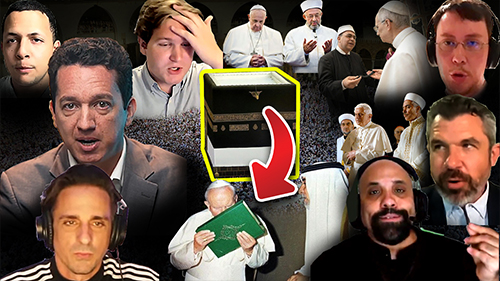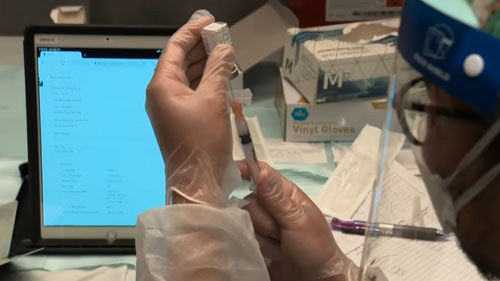| Recent Featured Videos and Articles | Eastern “Orthodoxy” Refuted | How To Avoid Sin | The Antichrist Identified! | What Fake Christians Get Wrong About Ephesians | Why So Many Can't Believe | “Magicians” Prove A Spiritual World Exists | Amazing Evidence For God | News Links |
| Vatican II “Catholic” Church Exposed | Steps To Convert | Outside The Church There Is No Salvation | E-Exchanges | The Holy Rosary | Padre Pio | Traditional Catholic Issues And Groups | Help Save Souls: Donate |  |









 " />
" /> " />
" /> " />
" /> " />
" /> " />
" />




Objection 4): What about material heresy? Can’t the Vatican II Popes only be material heretics?
Answer: A “material” heretic is a Catholic erring in good faith about a dogmatic issue. The Vatican II antipopes are without doubt real heretics. They cannot be material heretics (Catholics erring in good faith) for many reasons, most important among those reasons being: 1) they don’t hold the essential mysteries of Faith; 2) they reject obvious dogmas of which they are fully aware.
“Material heretic” is a term used by theologians to describe a Catholic erring in good faith regarding some Church teaching, who has not denied it deliberately. The only way that one can be a “material heretic” is by being unaware that the position that he holds is contrary to the teaching of the Church. Such a person would change his position immediately upon being informed of the Church’s teaching on the matter. Thus, a so-called “material heretic” is not a heretic, but rather a confused Catholic who denies nothing of that which he knows the Church to have taught. The fact that a so-called “material heretic” is not a heretic is proven by the fact that a so-called “material heretic” does not cease to be part of the Church; and we have already shown by many quotations that all heretics cease to be members of the Church.
Furthermore, a so-called “material heretic” (an erring Catholic) does not bring down on his head eternal punishment for denying the faith; and all heretics bring down on their heads eternal punishment for denying the faith.
A material heretic, therefore, is not a heretic, but a Catholic who is innocently mistaken about some Church teaching. Hence, those who claim that Benedict XVI is unaware of all of the dogmas that he denies, and is therefore only a “material heretic” (in other words, a mistaken Catholic) are not only arguing that which is absurd, but that which is IMPOSSIBLE. It is impossible that Benedict XVI is only a so-called “material heretic” for three reasons:
Number 1): It is a fact that Benedict XVI knows of the many dogmas of the Church which he denies. He knows more about Catholic teaching than almost anyone in the world. He discourses on the Church’s dogmatic pronouncements – the very same ones he contradicts and rejects, such as Vatican I – all the time.
In these quotations we see just a glimpse of Benedict XVI’s familiarity with Catholic teaching, including the very councils he denies. The same applies to John Paul II and his “predecessors.” For example, in the 1999 agreement with the Lutheran Church on Justification, approved by John Paul II, John Paul II agreed that the Council of Trent no longer applies.
It goes without saying that he cannot be unaware of the Council of Trent if he agrees that it no longer applies. Further, Benedict XVI holds several doctorates in theology and has written many books dealing with the intricacies of Catholic dogma. One of us has read 24 of his books, and can say that Benedict XVI is more familiar with what the Catholic Church teaches than almost anyone in the world. To assert that Benedict XVI or John Paul II or Paul VI or John XXIII remained unaware of the simplest Church teachings which they denied on Our Lord, against Protestantism, on salvation, against false religions, on religious liberty, etc. is false and ridiculous in the highest degree. To assert, for instance, that Benedict XVI is unaware of the dogma that Protestants are bound under pain of heresy to accept the Papacy – remember that he teaches just the opposite – is pure insanity. It’s equivalent to asserting that one can be the head chef at a five star restaurant and not know what lettuce is. But that’s exactly what those who advance the “material heretic” argument would have us believe.
Number 2): It’s impossible for Benedict XVI to be only a “material heretic” or a mistaken Catholic because – supposing for a moment that he were unaware of the many dogmas which he denies (which, as we have stated, is definitely not true) – being a man who claims to be a bishop and the pope, he is bound to have learned them. Therefore, there is no excuse for him on the grounds that he is unaware of the fundamental Church dogmas which he denies.
A canon law manual: “If the delinquent making this claim be a cleric, his plea for mitigation must be dismissed, either as untrue, or else as indicating ignorance which is affected, or at least crass and supine… His ecclesiastical training in the seminary, with its moral and dogmatic theology, its ecclesiastical history, not to mention its canon law, all insure that the Church’s attitude towards heresy was imparted to him.”[6]
Number 3): It is impossible that Benedict XVI is merely a “material heretic” because there are certain things that every adult must hold by a necessity of means in order to be a Catholic, and Benedict XVI doesn’t hold those things. Every adult Catholic must believe in the Trinity, the Incarnation, that Jesus Christ and His Church are true, and that other religions outside of Jesus Christ are false. These essential mysteries must be known by a necessity of means.
In other words, every Catholic above the age of reason must have a positive knowledge of certain mysteries of faith to be saved. There are no excuses, even for ignorance. Thus, if one holds a belief which destroys faith in those mysteries, even if he has been taught incorrectly, he is not a Catholic.
For instance, if one really believes in three different gods and not one God in three divine persons, then he is not a Catholic – period. This is true even if he was never taught the true doctrine on the Trinity. He is not a Catholic, since his belief contradicts an essential mystery he must possess to hold the true Faith.
Likewise, if one believes that other religions, such as Islam, Judaism, etc. are also good, then one doesn’t believe that Christ (and, by extension, His Church) is the only truth. If one doesn’t believe that Christ (and, by extension, His Church) is the only truth, then one doesn’t have the Catholic Faith – period. This is true even if he was never taught the true doctrine on this matter, which is why Pope Pius XI says that all who hold the opinion that all religions “are more or less good and praiseworthy” have abandoned the true religion – period.
Well, we have shown that Benedict XVI and his “predecessors” believe that Judaism, Islam, etc. are good. Benedict XVI was even initiated into Islam in a mosque on Nov. 30, 2006. He and his “predecessors” praise these religions. Benedict XVI specifically called Islam “noble” and said that it represents “greatness.” It’s not possible for him to believe this and be a Catholic “material heretic,” since he doesn’t believe in an essential mystery he must possess to hold the true Faith: that Christ is the only truth. Therefore, Benedict XVI is not a Catholic – period.
This is also proven from another angle. Since it’s an essential mystery of Catholic Faith that Christ (and, by extension, his Church) is the only truth, it follows that those who believe this mystery also hold that Christ’s Church must be believed. This is the teaching of Pope Leo XIII.
If one holds that the Catholic religion doesn’t have to be accepted by non-Catholics, then one is not a Catholic. As we’ve shown, the Vatican II antipopes teach that the Catholic religion doesn’t have to be accepted by non-Catholics; they specifically teach that the Eastern Schismatics don’t need to convert to the Catholic Faith.
Furthermore…
The law of the Church presumes pertinacity in heresy unless the contrary is proven.
In addition to the above facts which demonstrate that the Vatican II antipopes are definitely formal heretics, the presumption of the law is against them:
A commentary on this canon by Rev. Eric F. Mackenzie, A.M., S.T.L., J.C.L, states:
Not only have the Vatican II antipopes made literally hundreds of statements contrary to revealed and defined dogma, but they have also explicitly declared themselves to be in communion with – in the same Church as – schismatics and heretics. They have, furthermore, confirmed these statements with acts which further manifest their adherence to heresy, such as communicatio in sacris (communication in sacred things) with various false religions. It is not, therefore, the law or the spirit of the Church to exonerate someone publicly spewing heresy, but rather to presume him guilty.
St. Robert Bellarmine explains why this must be.
A simple illustration will also demonstrate why this must be.
Suppose you had some sheep and you appointed a shepherd to watch over them. Suppose one day the shepherd became a wolf and began eating the sheep and tearing them to pieces. Would you, looking after the welfare of these sheep, maintain the wolf as head of the sheep? Would you demand that the other sheep not yet eaten subject themselves to the wolf, and thus place themselves in proximate danger of being eaten? Of course you wouldn’t, and neither would God.
God could never allow one who is promulgating manifest heresy in the external forum to maintain authority in the Church or be able to demand the submission of Catholics, regardless of what his intentions are. Remember, heresy kills souls. Suppose the wolf in our story is just hungry, or having a bad day. Does this change the fact that the sheep are being eliminated? No.
Furthermore, what wolf who was trying to deceive people would openly declare himself to be a non-Catholic or an enemy of the Church?
There is no more effective way to assist a false prophet than to insist that he, despite his public profession of heresy, maintains authority in the Church. Pope St. Celestine authoritatively confirms the principle that we cannot regard a public heretic as a person with authority when dealing with the case of the heretic Nestorius. Nestorius, Patriarch of Constantinople, began to preach the heresy that Mary was not the Mother of God. The faithful reacted by breaking communion with him, having realized that since Nestorius was preaching public and notorious heresy he could not have authority in the Catholic Church. The following quote from Pope St. Celestine is found in De Romano Pontifice, the work of St. Robert Bellarmine.
Pope Pius IX confirms this principle by teaching that one is considered a heretic or a schismatic even if one has not yet been declared as such by the Holy See.
This is why the saints, theologians, doctors, canonists and popes who speak to the issue of a “heretical pope” avoid the terms “material” and “formal” heresy, for these are terms that imply a judgment of the internal forum. Rather, they use the words public, manifest, notorious, etc. – terms corresponding to the external forum.
What is a public defection from the faith?
Thus, we have shown in great detail why it’s utterly false to assert that the Vatican II antipopes are merely “material heretics.” They cannot be material heretics because 1) they know very well of the dogmas which they deny; 2) they are bound to know the Catholic Faith as “bishops,” especially the dogmas which they deny; and 3) they lack and contradict the essential mysteries of Faith which one must hold to be a Catholic.
See other Answers to the Most Common Objections Against Sedevacantism
[1] Decrees of the Ecumenical Councils, Vol. 1, p. 578.
[2] Decrees of the Ecumenical Councils, Vol. 1, p. 74.
[3] Benedict XVI, Principles of Catholic Theology, Ignatius Press, 1982, p. 239.
[4] Benedict XVI, Principles of Catholic Theology, pp. 197-198.
[5] L’Osservatore Romano, Special Insert, Joint Declaration of the Doctrine of Justification, November 24, 1999, #13.
[6] G. McDevitt, The Delict of Heresy, 48, CU, Canon Law Studies 77. Washington: 1932.
[7] The Papal Encyclicals, Vol. 1 (1740-1878), p. 45.
[8] The Papal Encyclicals, Vol. 1 (1740-1878), p. 46.
[9] The Papal Encyclicals, Vol. 3 (1903-1939), p. 30.
[10] The Papal Encyclicals, Vol. 3 (1903-1939), pp. 313-314.
[11] The Papal Encyclicals, Vol. 2 (1878-1903), p. 399.
[12] L’Osservatore Romano (the Vatican’s Newspaper), May 24, 1973, p. 6.
[13] L’Osservatore Romano, Jan. 27, 1993, p. 2.
[14] L’Osservatore Romano, August 24, 2005, p. 8.
[15] Eric F. Mackenzie, A.M., S.T.L., J.C.L. Rev., The Delict of Heresy, Washington, D.C.: The Catholic Univ. of America, 1932, p. 35. (Cf. Canon 2200.2).
[16] Decrees of the Ecumenical Councils, Vol. 1, p. 283.
[17] St. Robert Bellarmine, De Romano Pontifice, II, 30.
[18] The Papal Encyclicals, Vol. 1 (1740-1878), p. 416.
[19] Ius Canonicum. Rome: Gregorian 1943. 2:453.
Sign up for our free e-mail list to see future vaticancatholic.com videos and articles.
Recent Content
^